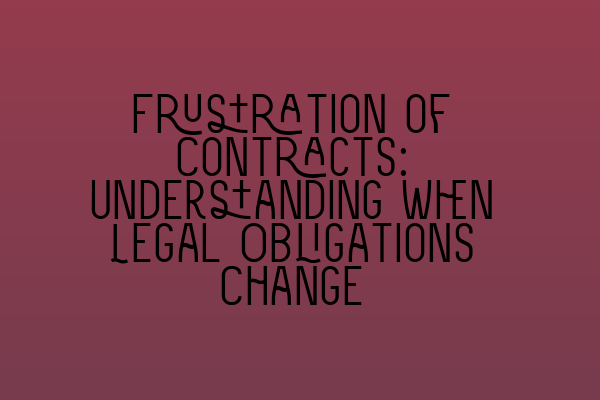Frustration of Contracts: Understanding When Legal Obligations Change
In the world of contract law, there are certain situations where fulfilling the obligations of a contract becomes impossible or drastically different from what was initially agreed upon. This concept is known as the frustration of contracts. Understanding when and how legal obligations can change due to frustration is crucial for both solicitors and individuals involved in contractual agreements. In this blog post, we will dive deep into the concept of frustration of contracts, its implications, and the circumstances under which it can arise.
At SQE Contract Law, we are committed to providing comprehensive information and guidance on various legal topics. To further expand your knowledge, we offer a range of preparatory courses for the Solicitors Qualifying Examination (SQE). Check out our related articles on SQE 1 Practice Exam Questions, SQE 1 Practice Mocks FLK1 FLK2, SQE 2 Preparation Courses, SQE 1 Preparation Courses, and SRA SQE Exam Dates.
What is Frustration of Contracts?
Frustration of contracts refers to the situations where the performance of a contract becomes impossible, illegal, or radically different from what was initially agreed upon. It is an important legal concept that serves to protect parties from unreasonable or unfair outcomes when circumstances beyond their control arise.
The Doctrine of Frustration
The doctrine of frustration allows parties to be relieved from their contractual obligations when certain unforeseen events occur. It is important to note that frustration is not the same as a breach of contract. Frustration occurs when an unforeseen event makes it impossible for either party to fulfill their obligations, even if they were willing and able to do so.
Circumstances Leading to Frustration
Several events or circumstances can lead to frustration of contracts. These events are typically beyond the control of the parties involved and could not have been reasonably foreseen at the time of entering into the contract. Some common examples include:
1. Death or Incapacity: If a party to a personal services contract dies or becomes incapacitated, it may be impossible to perform the contract as originally intended.
2. Destruction or Unavailability of Subject Matter: If the subject matter of the contract is destroyed or becomes unavailable, such as due to fire, natural disasters, or other causes, the contract may be frustrated.
3. Change in Law: If there is a significant change in the law that renders the contract illegal or impossible to perform, frustration may arise.
4. Supervening Event: The occurrence of an event that renders the performance of the contract fundamentally different from what was initially expected may also give rise to frustration. This could include events like war, strikes, or pandemics.
Effects of Frustration
When a contract is frustrated, the parties are discharged from their future obligations, and the contract comes to an end. The law seeks to provide fairness by relieving the parties from a contract that has become impossible to perform due to unforeseen circumstances. However, it is important to note that frustration does not absolve the parties from any obligations that have already accrued prior to the frustrating event.
Mitigation of Frustration
In some cases, the effects of frustration can be mitigated or managed through the application of certain legal doctrines. For example, the doctrine of temporary impossibility allows for the suspension of performance until the frustrating event is resolved. Additionally, the doctrine of temporary non-performance provides for the suspension of contractual obligations until the frustrating event is no longer an obstacle.
It is crucial to seek expert legal advice when dealing with frustration of contracts to fully understand your rights and obligations under the specific circumstances. At SQE Contract Law, we have a team of experienced solicitors who can provide guidance and support in matters related to contract law and frustration.
Conclusion
Understanding the concept of frustration of contracts is essential for solicitors and individuals involved in contractual agreements. Knowing when legal obligations can change due to frustration allows parties to navigate through unforeseen circumstances with clarity and make informed decisions. At SQE Contract Law, we strive to provide valuable information and resources on various legal topics. Explore our related articles for additional insights, and consider enrolling in our preparatory courses for the Solicitors Qualifying Examination (SQE) to further develop your legal knowledge and skills.
Related Articles:
– SQE 1 Practice Exam Questions
– SQE 1 Practice Mocks FLK1 FLK2
– SQE 2 Preparation Courses
– SQE 1 Preparation Courses
– SRA SQE Exam Dates
